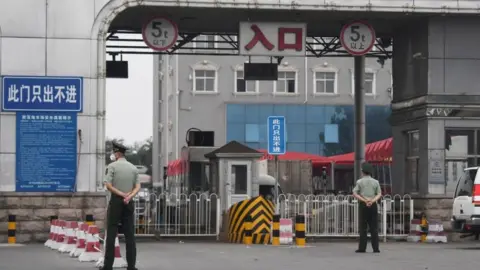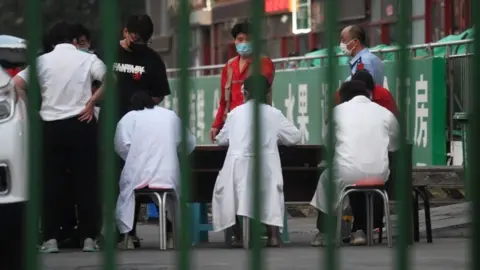Coronavirus: Fear of second wave in Beijing after market outbreak
 Getty Images
Getty ImagesAn area of the Chinese capital Beijing has been put under strict lockdown measures after the city's first coronavirus cases in more than 50 days.
The outbreak has been linked to the city's largest wholesale market.
A total of 45 people out of 517 tested at the Xinfadi market tested positive for Covid-19, a district official said. None was displaying symptoms.
Lockdowns have been imposed in 11 nearby neighbourhoods, while 10,000 market staff will be tested.
The authorities also want to test everyone who has had recent contact with the market as well as those living in the district surrounding it.
These are the first new confirmed cases in Beijing for more than 50 days.
What do we know about the new cases?
Xinfadi market in the city's south-western Fengtai district was shut down in the early hours of Saturday, after two men who had recently visited the market were reported to have Covid-19.
Tests at the market then showed 45 people had the virus.
 Getty Images
Getty Images"In accordance with the principle of putting the safety of the masses and health first, we have adopted lockdown measures for the Xinfadi market and surrounding neighbourhoods," Chu Junwei, a district official, told a briefing.
The district is in a "wartime emergency mode", he added.
Hundreds of military police have entered the now locked-down facility. Nearby transport links and schools have been closed.
Right across Beijing sport has been cancelled and major public facilities are pulling down the shutters again.
There will now be fears of a second wave of the virus in the capital.
China's coronavirus outbreak was brought under control through some of the world's strictest lockdown measures after the disease was detected in the city of Wuhan.
More than 4,600 people in China have lost their lives to the coronavirus out of around 426,000 worldwide, according to the Johns Hopkins University.


Chinese officials aren't sure how the huge Xinfandi wholesale market - which supplies 80% of Beijing's vegetables and meat - has become the source of a new coronavirus outbreak.
In recent months the Chinese government's strategy has been to completely isolate any town or city where a coronavirus cluster has emerged.
This appears to have worked but locking down all of Beijing, at time when it seemed like the virus emergency had been brought under control, is not something they'll want to do in a hurry.

- A SIMPLE GUIDE: What are the symptoms?
- LIKE 9/11 EACH DAY: A New York paramedic's diary
- FACTORY HOTSPOT: The untold story behind America's biggest outbreak
- GUNS & CHEESE: The unexpected items deemed 'essential'
- HOW YOU CAN HELP: Write a diary, donate blood, read books to kids

